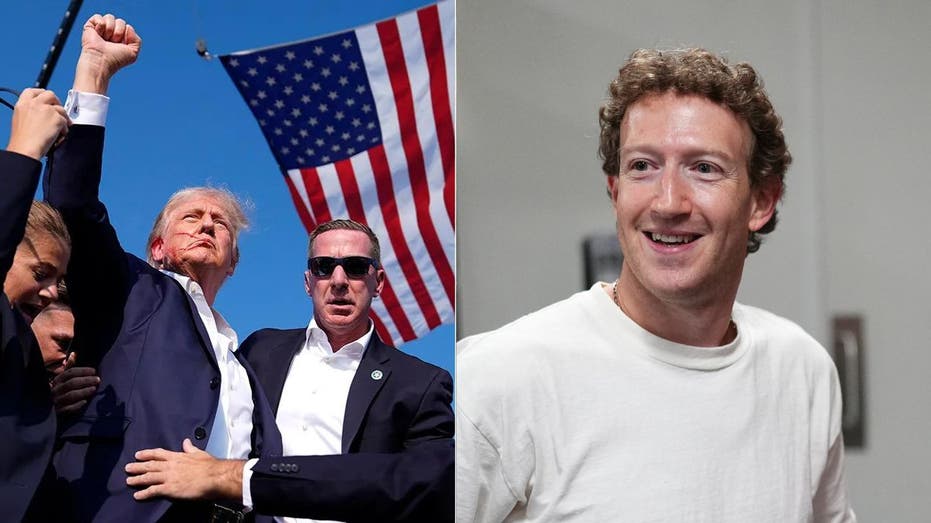Zuckerberg And Trump: A New Era For Facebook And Politics

Table of Contents
The Trump Presidency and Facebook's Rise
The Trump presidency coincided with a period of unprecedented growth and influence for Facebook. This wasn't merely coincidental; the two were inextricably linked. Trump's campaign effectively leveraged Facebook's vast user base to disseminate its messages, bypassing traditional media outlets. This symbiotic relationship significantly impacted the 2016 election and beyond.
-
Facebook's role in disseminating Trump's campaign messages: Trump's campaign utilized targeted advertising on Facebook to reach specific demographics with tailored messages, often employing divisive rhetoric and emotional appeals. This highly effective strategy allowed him to bypass traditional media gatekeepers and connect directly with voters.
-
The impact of targeted advertising on voter behavior: The use of sophisticated algorithms and micro-targeting allowed the Trump campaign to tailor its messaging to individual users, influencing their perceptions and potentially swaying their votes. The effectiveness of this approach remains a subject of intense debate and ongoing research.
-
The spread of misinformation and fake news during the 2016 election: Facebook's algorithm, prioritizing engagement over accuracy, inadvertently facilitated the rapid spread of misinformation and fake news during the 2016 election. This contributed to a climate of distrust and confusion, impacting voter choices and undermining democratic processes.
-
Growing concerns about foreign interference and data privacy: The 2016 election also highlighted concerns about foreign interference, with evidence suggesting that malicious actors exploited Facebook's platform to spread propaganda and sow discord. The Cambridge Analytica scandal further exacerbated concerns about data privacy and the misuse of user information for political purposes. The use of political advertising on Facebook became a focal point of concern regarding election interference and manipulation.
The relationship between Trump's populist rhetoric and Facebook's algorithm, which prioritized engagement over accuracy, created a powerful force that significantly influenced public opinion and the election outcome. The Cambridge Analytica scandal, which involved the harvesting of user data to influence voters, further exposed the vulnerabilities of the platform and intensified scrutiny of Facebook's practices. This period fundamentally altered the perception of social media's role in shaping political narratives and influencing electoral outcomes, highlighting the critical need for responsible use of social media influence and political advertising.
Zuckerberg's Testimony and Congressional Scrutiny
Mark Zuckerberg's appearances before Congress were a pivotal moment in the ongoing debate about Facebook's responsibility. These hearings stemmed from mounting concerns about the platform's role in the 2016 election and subsequent controversies.
-
Key criticisms leveled against Zuckerberg and Facebook: Zuckerberg faced intense questioning regarding Facebook's role in the spread of misinformation, foreign interference, and data privacy violations. Critics argued that Facebook's algorithms and business model inadvertently incentivized the spread of harmful content.
-
Facebook's responses to regulatory pressures: Facebook responded to the criticisms by implementing various measures, including increased investment in content moderation, fact-checking initiatives, and efforts to combat foreign interference. However, these measures have faced ongoing scrutiny and criticism.
-
The ongoing debate surrounding content moderation and censorship: The debate over content moderation on Facebook is ongoing and highly contentious. Critics argue that Facebook's efforts to remove harmful content are insufficient and inconsistently applied, while others express concerns about censorship and the potential for bias. The balancing act between free speech and the prevention of harm remains a central challenge.
-
The impact of regulatory scrutiny on Facebook's business model: The regulatory scrutiny faced by Facebook has had a significant impact on its business model, leading to increased costs and potential limitations on its advertising practices. This has led to important discussions surrounding data privacy regulation and the need for greater transparency in political advertising. Congressional hearings and ongoing investigations have created a complex regulatory landscape for social media companies.
The Impact on Political Discourse
The Zuckerberg-Trump dynamic has profoundly impacted political discourse and public opinion. The ease with which misinformation spreads online has exacerbated existing political divisions and created new challenges for democratic processes.
-
Polarization and echo chambers on Facebook: Facebook's algorithms can contribute to the creation of echo chambers, where users are primarily exposed to information confirming their existing biases. This can lead to increased political polarization and a lack of constructive dialogue.
-
The rise of online harassment and hate speech: The anonymity and scale of social media platforms have facilitated the rise of online harassment and hate speech, further exacerbating political divisions and silencing dissenting voices.
-
The spread of conspiracy theories and disinformation: Facebook has become a breeding ground for conspiracy theories and disinformation campaigns, which can undermine trust in institutions and sow discord within societies. Misinformation campaigns often leverage existing political divisions to spread their narratives.
-
The challenges of fostering constructive political debate online: Creating a space for productive political debate online is a significant challenge. The prevalence of misinformation, harassment, and echo chambers makes it difficult to engage in meaningful dialogue across ideological divides. The impact of algorithmic biases on the dissemination of information further complicates this issue.
The Future of Facebook and Politics
The future of Facebook's role in politics remains uncertain. The evolving regulatory landscape and changing user behavior will likely reshape the platform's influence in the years to come.
-
Potential changes to Facebook's algorithms and policies: Facebook is likely to continue to make changes to its algorithms and policies in response to regulatory pressures and evolving societal concerns. These changes may involve greater transparency, more rigorous content moderation, and potentially alterations to its advertising practices.
-
The role of independent fact-checkers and media literacy education: Independent fact-checkers and media literacy education will play an increasingly important role in combating misinformation and promoting informed political discourse. These initiatives aim to empower users to critically evaluate the information they encounter online.
-
The impact of emerging technologies on political communication: Emerging technologies, such as artificial intelligence and virtual reality, will likely transform political communication in ways that are difficult to predict. These technologies present both opportunities and challenges for political discourse.
-
The ongoing debate around the regulation of social media platforms: The debate over the regulation of social media platforms is far from over. Governments worldwide are grappling with how best to balance the principles of free speech with the need to protect users from harm and ensure fair elections. The future of social media regulation will significantly impact the role of platforms like Facebook in political discourse. Algorithmic transparency and accountability are key elements in this ongoing discussion.
Conclusion
The relationship between Zuckerberg and Trump represents a pivotal moment in the history of social media and politics. The impact of their intertwined trajectories is still unfolding, demanding ongoing scrutiny and critical analysis. Understanding the dynamics between "Zuckerberg and Trump" is crucial to navigating the complex challenges facing democratic discourse in the digital age. We must continue to engage in informed discussion about the future of Facebook and politics to ensure a healthier and more transparent information ecosystem. Further research into the intricacies of "Zuckerberg and Trump's" impact is essential to build a more resilient and responsible digital landscape. The ongoing conversation surrounding "Zuckerberg and Trump" necessitates a continued commitment to media literacy and responsible social media usage.

Featured Posts
-
 Novak Djokovics Straight Sets Defeat At Monte Carlo Masters 2025
Apr 27, 2025
Novak Djokovics Straight Sets Defeat At Monte Carlo Masters 2025
Apr 27, 2025 -
 The Economic Fallout Assessing The Impact Of A Canadian Travel Boycott On The Us
Apr 27, 2025
The Economic Fallout Assessing The Impact Of A Canadian Travel Boycott On The Us
Apr 27, 2025 -
 Green Bay Packers International Game Plans For 2025
Apr 27, 2025
Green Bay Packers International Game Plans For 2025
Apr 27, 2025 -
 Motherhood Milestone Belinda Bencics Return To Wta Success
Apr 27, 2025
Motherhood Milestone Belinda Bencics Return To Wta Success
Apr 27, 2025 -
 Exploring Ariana Grandes Style Evolution Professional Help And Creative Direction
Apr 27, 2025
Exploring Ariana Grandes Style Evolution Professional Help And Creative Direction
Apr 27, 2025
